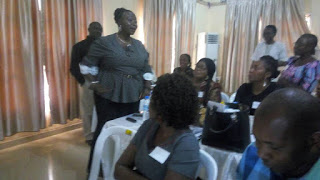 |
| A cross-section of journalists at the training |
By Fatima Muraina
The Network of Reproductive Health Journalists of Nigeria (NRHJN) has objected to the expanded Global Gag Rule introduced by President Donald Trump observing that it portends adverse consequences and devastating effects on the health of women and girls in Nigeria.

This was contained in a communique signed by both Chairman and Secretary of the Network Mr. Roland Ogbonnaya and Mrs. Yinka Shokunbi respectfully issued at the end of the network’s three day capacity training and meeting held in ibadan, the Oyo state capital
The Network, in the communique observed that more Nigerian women are losing access to contraception while more incidences of unintended and unwanted pregnancies, abortions and unsafe abortions and deaths of women are being recorded as a result of the GGR.
The Network called on religious and traditional leaders to help debunk myths and misconceptions around family planning and to promote its acceptance.
It tasks medical and health personnel in the country to be committed towards reducing the stigma around abortion especially as it is a factor in the high rate of deaths resulting from unsafe abortion practices.
It advised the federal government on the need to respond to Trump’s GGR by investing more in health and taking advantage of family planning as a development strategy to save billions in scarce resources to reduce poverty.
It also urged the federal government to utilize monies recovered from corrupt persons in providing access to healthcare, especially at the grassroots for women and children. Charging federal government to be more committed to the health of women by protecting their health and promoting the rights issue.
In addition, both federal and state governments were urged to appreciate that putting money in health and human infrastructure is an investment and not expenditure as it tasked the Federal government to be more committed and responsive towards issues concerning women by providing accessible and affordable contraceptive services in the country .
The Network, which is a Non-Governmental, non-partisan, not-for-profit group of Nigerian journalists advocating for Sexual and Reproductive Health Rights (SRHR) issues and policies observed that the state of reproductive health care in the country is below acceptable standard and that government at the Federal and state levels are not doing enough to improve the situation.
While it observed that Nigeria is in a demographic crisis as a result of poor investment in family planning tools/services and health infrastructure, It regreted the poor state of health facilities around the country and huge economic burden imposed on Nigerians when seeking healthcare.
It however, regreted that state governments have abandoned their responsibilit of provision of Primary Health Care services to the Federal Government inspit that health care falls under the concurrent list of the 1999 constitution as amended.
Women, the network observed have been denied access to contraceptive services which is a breach of their fundamental human rights observing the low use of modern contraceptives which contributed to a large population burden ledding to a strain on development and allocation of resources.











